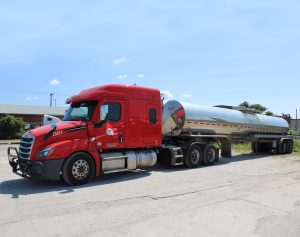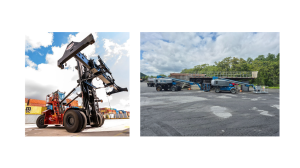If you are in the trucking industry, becoming an owner operator is a significant decision that can lead to great rewards and substantial challenges. While the allure of independence, higher earning potential, and the freedom to manage your own business is appealing, it’s essential to understand the full scope of what this career path entails.
Let’s explore the pros and cons of being an owner-operator, weigh the benefits against the challenges and determine if this path is right for you.
What is an Owner Operator?
An owner operator is a self-employed driver who owns and operates his vehicle. Unlike company drivers, owner operators have full control over their business operations, from choosing routes and clients to managing expenses and maintenance.
Pros of Being an Owner Operator
1. Independence and Flexibility
One of the most attractive aspects of becoming an owner operator is the independence it offers. As your boss, you can make all business decisions, from choosing which contracts to accept to planning your routes. This level of control allows you to tailor your work to your preferences and operational style. Flexibility is another significant benefit, as you can decide when and where to work, allowing you to create a schedule that fits your personal life and commitments.
2. High Earning Potential

Owner operators often have the potential to earn more than company drivers. You can significantly increase your income by managing expenses efficiently and securing profitable contracts. Since you are directly responsible for your earnings, you can maximize profits through strategic decision-making and maintaining high operational standards. This direct pay model also means faster payments, providing better financial control and liquidity.
3. Choose Your Own Equipment
One of the perks of being an owner operator is the ability to choose your own truck and equipment. This allows you to select the best tools for your needs, ensuring comfort and efficiency on the road. Owning your equipment also means you can customize and maintain it to your standards, which can improve your overall driving experience and productivity.
4. Control Your Schedule
Being an owner operator allows you to control your schedule. You decide when to hit the road and when to rest, allowing for a work-life balance that suits you. This flexibility is especially beneficial for managing personal commitments and avoiding burnout. Unlike company drivers with rigid schedules, you can plan your trips around family events, vacations, or personal downtime.
5. Bring a Buddy
Another unique advantage is the ability to bring a companion on the road. Whether it’s a family member, friend, or even a pet, having company can make long trips more enjoyable and less lonely. This can significantly improve your mental well-being and make your job less isolating. A buddy can also provide additional support and assistance during trips, enhancing your overall experience.
6. Take Time Off When You Want It
The flexibility of being an owner operator extends to your vacation time. Unlike company drivers, who may need to request time off in advance and wait for approval, owner operators can take time off whenever required. This freedom allows you to rest and recharge on your terms, helping to prevent burnout and maintain a healthier work-life balance.
7. Building Your Business Around Lifestyle
One of the most significant benefits of being an owner operator is the ability to build your business around your lifestyle. You can prioritize what matters most to you: family, hobbies, or personal interests. This means you can structure your business operations to align with your values and goals, creating a more fulfilling and balanced life. This level of customization can lead to greater job satisfaction and overall happiness.
Cons of Being an Owner Operator

1. Obtain Own Funding
One of the most significant challenges of becoming an owner operator is securing the initial funding to purchase a truck and other necessary equipment. This is a substantial financial burden, especially for those just starting out. Obtaining loans or financing can take time and effort. It also requires a good credit score and a solid business plan. The initial investment can strain personal finances and may involve significant debt.
2. More Business Responsibilities
As an owner operator, you are a driver and a business owner. This means you have to handle various business responsibilities, including bookkeeping, invoicing, taxes, and compliance with industry regulations. Managing these administrative tasks can be time-consuming and requires attention to detail. Additionally, you must stay updated on industry standards and legal requirements to operate your business.
3. Extra Costs
Operating as an owner operator comes with numerous additional costs that company drivers do not have to worry about. These expenses include fuel, maintenance, insurance, permits, and tolls. Unexpected repairs and maintenance can add up quickly, impacting your profitability. Furthermore, these costs are ongoing, meaning you must manage your finances carefully to maintain a positive cash flow and cover all expenses.
4. Work-Life Balance
While being an owner operator offers flexibility, it can also blur the lines between work and personal life. Long hours on the road and business responsibilities can lead to an imbalanced work-life dynamic. The pressure to keep your business profitable may result in working more hours than anticipated, leaving little time for family, friends, and personal activities. Additionally, the long hauls can affect your mental and emotional well-being. Find some ways to stay connected and manage stress effectively.
Is It Worth Becoming an Owner Operator?
Whether to become an owner operator depends on your personal and financial circumstances. If you value independence, have an entrepreneurial mindset, and are willing to take on the risks and responsibilities, being an owner-operator can be a rewarding and lucrative career choice. However, it is crucial to be prepared for the financial and operational challenges of the role.
FAQs
On average, owner-operators earn between $100,000 to $150,000 annually before expenses. Earnings vary based on factors like the type of freight, mileage, and efficiency in managing costs
Ongoing expenses include fuel, maintenance, insurance, permits, tolls, and other operational costs.
Owner-operators typically need various types of insurance, including liability insurance, cargo insurance, physical damage insurance, and possibly bobtail insurance.
Funding can be through personal savings, loans, or financing options. A good credit score and a solid business plan can help secure the necessary funds.
Regular maintenance includes oil changes, tire rotations, brake inspections, and other routine checks. Unexpected repairs can also occur, so it’s essential to have a maintenance fund set aside.




